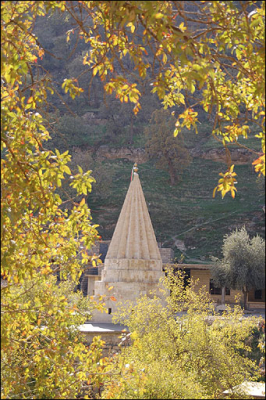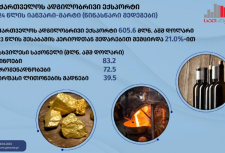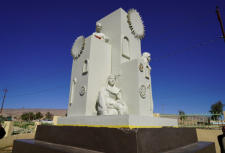MALAK-TĀWŪS: THE PEACOCK ANGEL OF THE YEZIDIS Part 2

Community
As for the minor deities of the Yezidi pantheon, the spirits, demons, and so on, their existence provides no reason to talk of polytheism, for similar characters (including the exact counterparts of those of the Yezidis) have been retained by many Iranian (and non-Iranian) Islamic nations at the level of the so-called popular or folk Islam. Therefore, in this work “pantheon” is used as a provisional term denoting the variety of divine incarnations, divinities, spirits, demons and so on, in other words all that is sacral (considering the ambivalence of the sacral in a wider sense, wherein this term exists in the modern religious knowledge for the designation of all that is non-profane, everything that goes beyond the boundaries of the profane world), or, in other words, all hierophanies attested in the Yezidi beliefs.
The One God
The Yezidi Holy Triad comprises the following: Malak-Tāwūs, the Peacock-Angel (in the Yezidi imagination it is featured as a bird, a peacock or a cock, and sometimes even a dove); Sheikh ‘Adi (Šeyx‘Ādī = Sheikh ‘Adi bin Musafir, a historical personality, the founder of the proto-Yezidi community, as an old man); Sultan Yezid (Silt’ān Ēzīd, as a youth). All three characters are manifestations of God—Xwadē (or Xwadī, Xudā, the term, deriving from New Pers. xudāy). There are also other variations to designate God: xudāvand, rab(b)ī, as well as allāh (mostly in the Arabic formulas); occurring in some religious songs is the term ēzdān (from New Pers. yazdān—“god”). The Yezidi ideas on Xwadē are quite hazy and blurred, and can be subjected to systemic processing only with great difficulty. The Yezidi Xwadē resembles neither Zeus, the humanised father of the gods of Ellas, nor Yahweh, the almighty and ruthless god of the Jews. Xwadē is little reminiscent of the absolute Allah in Islam or the all-forgiving and merciful God of the Christians. The main thing that makes him equivalent to the One God of the dogmatic religions, and what actually is essential, is his transcendentalityand his function of demiurge, as the Creator. However,
according to the Yezidi tradition, despite being creator of the Universe, Xwadē is completely indifferent to its fate; he is not concerned with worldly affairs or human fortune. It is not an accident that in the Yezidi liturgy, as well as in the oral tradition, direct address to Xwadē is a very rare occasion, and nor does he want any offerings. There is, however, at least one specimen of religious text dedicated to God, Xwadē, directly, which can be described rather as a glorification than an address in prayer. It is actually called “Madh’ē Xwadē”, that is, “Glorification of God”, or “Praise to God”.5 See the text of this prayer, emended occasionally:
Yā, řabīō, tu dāymī,
Tu k’arīmī,
Tu řāh’īmī,
Tu qadīmī,
Tu xudāye har xudāyī,
Xudāye milk-ē k’arīmī,
Tu xudāne a’ršē a’zīmī (rather, a’zmānī),
A’nzaldā dānī qadīmī,
Har xudāyē har xudāyī.
Hin mak’āyī (that is, mak’ānī), hin maǰāyī (maǰālī),...
Tu xudāyē ǰin ū isī [insī],
Xudāyē a’rš ū k’ursī.
Tu xudāyē ‘ālam ū qusī (rather, ‘ālamī qudsī),
Har xudāyē har xudāyī.
Hin mak’āyī, hin maǰāyī,
Kas nizāna tu čawāyī,
Har xudāne har xudāyī...
Ta na māla, ta na p’arda,
Ta na lawma (rather, lawna), ta na ranga,
Ta na āwāza, ta na danga,
Kas nizāna tu čawānī,
Har xudāyē har xudāyī.
Walīyē farz ū nimēžanī...
Řuh’ā didī, ruh’ā diparēžī.
H’ākimē šāh ū gadānī,
H’ākimē ǰimh’ī ‘ālamī.
Ta dīhār kir Īsā ū Maryam,
Ta am kirin tažbatī (perhaps, ži batnī, cf. Arab. baãn) Ādam.
Har xudāyē har xudāyī...
“O, my Lord, you are eternal,
You are merciful,
You are graceful,
You are ancient,
You are God of all gods,
The God possessing kindness.
You are God of the firmament of heaven,
Initially ancient,
[You] are God of all gods.
[You] are both refuge and might,
[You] are God of spirits and people,
God of the firmament and throne.
You are God of the realm of sanctity,
You are God of all gods.
[You] are both refuge and might,
No one knows what you are,
[You] are God of all gods.
You have no home, no shelter,
You have no colouration, no colour,
You have no voice, nor sound,
No one knows what you are,
[You] are God of all gods.
[You] are the master of prescriptions and prayers.
You give souls [to people] and [yourself] break the souls,
[You] are the ruler over both kings and plebeians,
[You] are the ruler of the entire world,
You have created Jesus and Mary,
You have created us [the Yezidis] from the loins of Adam.6
[You] are god of all gods, etc…”
Tags: yazidisinfo cultureofyazidis historyofyazidis ezidi езиды езидымира культураезидов
MALAK-TĀWŪS: THE PEACOCK ANGEL OF THE YEZIDIS Part 2

Community
As for the minor deities of the Yezidi pantheon, the spirits, demons, and so on, their existence provides no reason to talk of polytheism, for similar characters (including the exact counterparts of those of the Yezidis) have been retained by many Iranian (and non-Iranian) Islamic nations at the level of the so-called popular or folk Islam. Therefore, in this work “pantheon” is used as a provisional term denoting the variety of divine incarnations, divinities, spirits, demons and so on, in other words all that is sacral (considering the ambivalence of the sacral in a wider sense, wherein this term exists in the modern religious knowledge for the designation of all that is non-profane, everything that goes beyond the boundaries of the profane world), or, in other words, all hierophanies attested in the Yezidi beliefs.
The One God
The Yezidi Holy Triad comprises the following: Malak-Tāwūs, the Peacock-Angel (in the Yezidi imagination it is featured as a bird, a peacock or a cock, and sometimes even a dove); Sheikh ‘Adi (Šeyx‘Ādī = Sheikh ‘Adi bin Musafir, a historical personality, the founder of the proto-Yezidi community, as an old man); Sultan Yezid (Silt’ān Ēzīd, as a youth). All three characters are manifestations of God—Xwadē (or Xwadī, Xudā, the term, deriving from New Pers. xudāy). There are also other variations to designate God: xudāvand, rab(b)ī, as well as allāh (mostly in the Arabic formulas); occurring in some religious songs is the term ēzdān (from New Pers. yazdān—“god”). The Yezidi ideas on Xwadē are quite hazy and blurred, and can be subjected to systemic processing only with great difficulty. The Yezidi Xwadē resembles neither Zeus, the humanised father of the gods of Ellas, nor Yahweh, the almighty and ruthless god of the Jews. Xwadē is little reminiscent of the absolute Allah in Islam or the all-forgiving and merciful God of the Christians. The main thing that makes him equivalent to the One God of the dogmatic religions, and what actually is essential, is his transcendentalityand his function of demiurge, as the Creator. However,
according to the Yezidi tradition, despite being creator of the Universe, Xwadē is completely indifferent to its fate; he is not concerned with worldly affairs or human fortune. It is not an accident that in the Yezidi liturgy, as well as in the oral tradition, direct address to Xwadē is a very rare occasion, and nor does he want any offerings. There is, however, at least one specimen of religious text dedicated to God, Xwadē, directly, which can be described rather as a glorification than an address in prayer. It is actually called “Madh’ē Xwadē”, that is, “Glorification of God”, or “Praise to God”.5 See the text of this prayer, emended occasionally:
Yā, řabīō, tu dāymī,
Tu k’arīmī,
Tu řāh’īmī,
Tu qadīmī,
Tu xudāye har xudāyī,
Xudāye milk-ē k’arīmī,
Tu xudāne a’ršē a’zīmī (rather, a’zmānī),
A’nzaldā dānī qadīmī,
Har xudāyē har xudāyī.
Hin mak’āyī (that is, mak’ānī), hin maǰāyī (maǰālī),...
Tu xudāyē ǰin ū isī [insī],
Xudāyē a’rš ū k’ursī.
Tu xudāyē ‘ālam ū qusī (rather, ‘ālamī qudsī),
Har xudāyē har xudāyī.
Hin mak’āyī, hin maǰāyī,
Kas nizāna tu čawāyī,
Har xudāne har xudāyī...
Ta na māla, ta na p’arda,
Ta na lawma (rather, lawna), ta na ranga,
Ta na āwāza, ta na danga,
Kas nizāna tu čawānī,
Har xudāyē har xudāyī.
Walīyē farz ū nimēžanī...
Řuh’ā didī, ruh’ā diparēžī.
H’ākimē šāh ū gadānī,
H’ākimē ǰimh’ī ‘ālamī.
Ta dīhār kir Īsā ū Maryam,
Ta am kirin tažbatī (perhaps, ži batnī, cf. Arab. baãn) Ādam.
Har xudāyē har xudāyī...
“O, my Lord, you are eternal,
You are merciful,
You are graceful,
You are ancient,
You are God of all gods,
The God possessing kindness.
You are God of the firmament of heaven,
Initially ancient,
[You] are God of all gods.
[You] are both refuge and might,
[You] are God of spirits and people,
God of the firmament and throne.
You are God of the realm of sanctity,
You are God of all gods.
[You] are both refuge and might,
No one knows what you are,
[You] are God of all gods.
You have no home, no shelter,
You have no colouration, no colour,
You have no voice, nor sound,
No one knows what you are,
[You] are God of all gods.
[You] are the master of prescriptions and prayers.
You give souls [to people] and [yourself] break the souls,
[You] are the ruler over both kings and plebeians,
[You] are the ruler of the entire world,
You have created Jesus and Mary,
You have created us [the Yezidis] from the loins of Adam.6
[You] are god of all gods, etc…”
Tags: yazidisinfo cultureofyazidis historyofyazidis ezidi езиды езидымира культураезидов

























